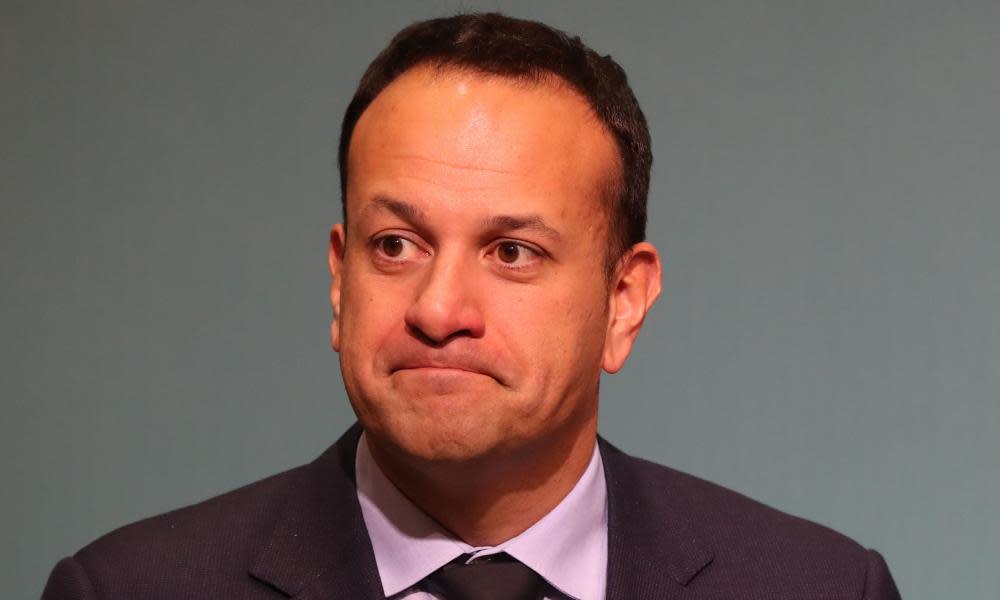Varadkar says Ireland is stepping up plans for no-deal Brexit

Ireland is stepping up contingency plans for a no-deal Brexit as Theresa May prepares to visit the Irish border.
The Irish taoiseach, Leo Varadkar, said the instability in Westminster meant there was no guarantee that a withdrawal agreement, even if agreed in Brussels, would get passed in London.
“We can’t make assumptions that the withdrawal agreement will get through Westminster,” he said. “It’s not evident, or not obvious, that the government of Britain has the majority for any form of Brexit, quite frankly.”
Because of this, he said, his government would step up plans for a no-deal scenario.
His deputy, Simon Coveney, will brief the Irish cabinet at a meeting in Kerry on Wednesday about contingency planning, including the recruitment of extra customs officer for ports and airports.
On Thursday May is due to arrive in Northern Ireland for a two-day visit. She will visit a border area and meet businesspeople to hear their views. On Friday she will give a speech in Belfast about the government’s Brexit white paper and how it addresses the Irish border issue.
She is also due to meet the main Stormont party leaders to try to kickstart a new round of talks on restoring power-sharing in the devolved assembly.
Concerns have been raised that an amendment to the customs bill passed in the Commons on Monday night making a border in the Irish Sea unlawful will leave the prime minister unable to deliver a backstop solution for Northern Ireland in the event of no deal.
The amendment, supported by Kate Hoey, the Northern Ireland-born MP for Vauxhall in London, went through on a nod on Monday night and makes it illegal for the government to enter into “any agreements under which Northern Ireland forms part of a separate territory to Great Britain”.
May said on Wednesday: “I’ve been clear we will not accept the imposition of any border down the Irish Sea and we will preserve the integrity of the UK’s internal market and Northern Ireland’s place within it.”
Coveney told RTÉ’s Morning Ireland on Wednesday that Brexiter amendments to the UK government’s customs and trade bills were “unhelpful”. He said the law banning a border in the Irish Sea could be trumped by the Good Friday agreement, which gives voters the right to self-determination and has the status of an international treaty. Coveney said he did not accept that the amendment made the backstop illegal.
Michel Barnier, the EU’s chief negotiator for Brexit, will advise 27 member states at a European council meeting on Friday to deepen contingency planning. A 15-page EU draft review of the UK white paper, seen by RTÉ, says the consequences of no deal “will be very real for citizens, professionals and business operators”.
Separately, Sinn Féin has come under concerted attack north and south of the border from rivals who say its seven MPs could have defeated the Brexiter amendments had it abandoned its Westminster abstentionist policy.
Charlie Flanagan, the justice minister and a member of Varadkar’s Fine Gael party, tweeted: “The refusal by Sinn Féin to take up its Westminster seats has plunged the British PM into the clutches of the hard Brexiteers again. Government wins knife-edge vote by wafer thin margin.”
Stephen Donnelly, the Brexit spokesman for Fianna Fáil, which is in a supply-and-confidence government with Fine Gael, also criticised Sinn Féin.
Westminster #Brexit vote to keep UK in the Customs Union lost by five votes tonight. Sinn Fein's 7 MPs could have changed Brexit completely, safeguarding Northern Ireland & jobs in the Republic.
— Stephen Donnelly (@DonnellyStephen) July 17, 2018
Sinn Féin has operated an abstentionist policy for 100 years, standing for elections in Northern Ireland but not taking its seats. . The trade bill was passed by just six votes, and amendments to the customs bill were won by three and four votes.
“Hardline Brexiteers won last evening’s Westminster vote because of Sinn Féin abstentionism,” the Fianna Fáil leader, Micheál Martin, said.
It is the first time in years that Sinn Féin’s abstentionist policy has come under such a concerted attack. The health minister, Simon Harris, also criticised the party for not taking its chance to influence Brexit policy.
I get the history & I understand the fact that abstentionism is a policy pursued by Sinn Fein but surely now when there is a chance to positively influence the Brexit situation and therefore help Ireland - North & South - using your key votes in Westminister is necessary
— Simon Harris TD (@SimonHarrisTD) July 18, 2018
Northern Ireland voted 56% in favour of remaining in the EU in the 2016 referendum.

 Yahoo News
Yahoo News 
